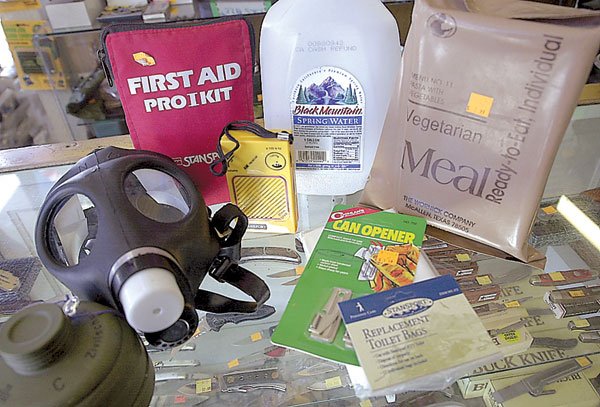By ZEB CARABELLO
&
amp; DAVE STEFFENSON
Staff Writers
GILROY
– Standing outside the U.S. Navy recruitment office in the old
Nob Hill shopping center Tuesday afternoon, 20-year-old Pete
Hernandez enjoyed one last McDonald’s cheeseburger and milkshake
before shipping off to boot camp.
By ZEB CARABELLO & DAVE STEFFENSON
Staff Writers
GILROY – Standing outside the U.S. Navy recruitment office in the old Nob Hill shopping center Tuesday afternoon, 20-year-old Pete Hernandez enjoyed one last McDonald’s cheeseburger and milkshake before shipping off to boot camp.
With President George Bush’s war deadline only hours away, Hernandez later said good-bye to his family and Gilroy home one last time as he prepared to be shipped to Michigan for his military training.
Hernandez knows that many people question his decision to join the Navy at such a dangerous time, but he’s simply keeping his promise to Uncle Sam, he said.
“When I came in a few months ago, they told me it was better to sign up now than to get drafted,” said Hernandez, a wild-haired, slightly-built young man who said he has never been on a boat in the ocean or away from home for an extended period of time. Hernandez was employed at Round Table Pizza on First Street until earlier this week.
“Wars happen,” he said. “They come and go – so why worry about it? At least this gives me something to do; I like water and I like to travel.”
Hernandez will train at boot camp for nine weeks and then attend additional training for three months before leaving the country on any mission, “so it’s not really worth worrying about (how long the war will last) right now,” he said.
But to many Gilroyans, worrying is all they can do.
Cynthia Torres’ son Hector left at 6:15 a.m. Tuesday for Camp Doha in Kuwait.
“Never in my wildest dreams did I think this would happen again,” she said.
Cynthia is all too familiar with losing her loved ones to the Persian Gulf. Her husband was sent to the first Persian Gulf war in the early 1990s and returned a different man.
“Absolutely, he came back a changed man. He was estranged from the kids,” she said. “It led to our divorce.”
Now Cynthia was saying good-bye to her 23-year-old son Hector, a combat military policeman who has already had an 11-month stint in Bosnia during the first four years of his six-year commitment to the service.
“I told him ‘Don’t lose the faith, keep your head up, stay focused, and I love you and I’ll see you in a couple of months,’ ” she said. “It was just a horrific experience letting him go.”
With war looming, it’s not just the soldiers and their families who will be effected, it will be everyone from highway patrol officers to teachers to taxpayers.
Starting Tuesday, the Gilroy area California Highway Patrol ordered its officers to be on “high alert,” essentially meaning that instead of working normal eight and-a-half hour shifts, the officers will be required to work 12-hour shifts until the alert status is lowered by the state.
Burdened with the task of patrolling the area’s power plants, reservoirs, bridges, dams and other possible terrorist targets, the CHP will log massive amounts of overtime throughout the war.
“We’ll essentially have double our normal force at many times,” said Gilroy CHP spokesperson Terry Mayes. “The idea is to have a mobile force of bodies to respond anywhere in the state and keep control of our area … If you are pulled over to the side of the road or parked in an area that looks suspicious, we will check you.”
At local army supply stores, people are also buying gear to prepare for the worst.
Mary Saccullo, who owns Sacullo Shower Door Mfg. & Discount Surplus store, 7648 Monterey St., with her husband John, said sales of gas masks, portable toilets, “ready meals” and other emergency items have been steady the last few days, but fail in comparison to the panic that followed Sept. 11, 2001.
“Most of the people getting gas masks are commuters to San Jose or the city who want (the gas masks) for their car,” she said. “But aside from that, everyone seems pretty level-headed. This is earthquake country, so most people already have their emergency supplies.”
Gilroy’s school teachers will also have to deal with the war and its effect on students.
Gilroy High School government and economics teacher Kanani Pratt said she will use the war as a way to integrate her class lessons with real life.
She has been teaching her advanced government and economic classes about the effects of war on the economy, and she has also asked her students to decide if they support Bush’s decision to go to war or not, and why.
“I would say most of the students support the war and the president,” Pratt said. “The main objective is that the students learn something from this. … I’m not planning on showing coverage of things being blown up and combat; listening to the commentary of respected journalists and others is the best way to learn about a war.”













